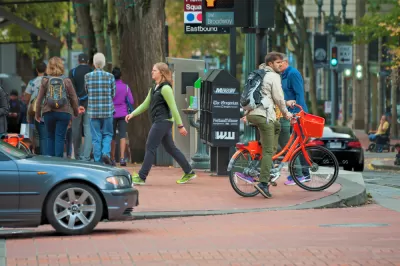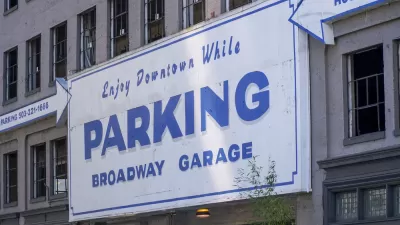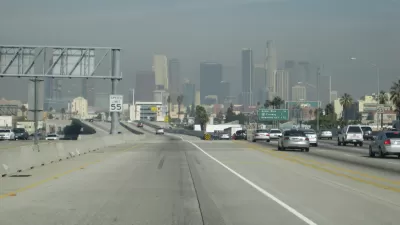A new task force is being assembled in Portland to implement new road pricing mechanisms that convinces people to ditch their cars for more efficient modes of travel, while also ensuring low-income communities don't bear too much of the burden.

The Portland City Council this week approved a plan "to study short-and-long-term strategies to charge people to use city streets, an effort intended to reduce congestion and curb carbon emissions as the region expects as many as 500,000 new residents by 2040," reports Andrew Theen.
The Pricing for Equitable Mobility task force will be tasked with recommending a pricing scheme from among a number of options: "cordon pricing, a potential fee for Uber and Lyft fares, more demand-based parking pricing, and potentially a local fee to charge drivers based on how many miles they drive."
According to Theen, the city and state have been building momentum for new pricing scheme on roads around Portland for a few years, but substantive progress has been hard to come by. "The Legislature in 2017 also kickstarted a plan to study whether and how to charge drivers on Interstate 5 and 205 in the Portland area. The state has since applied for tolling approval from the federal government," reports Theen.
FULL STORY: Portland to create ‘equitable mobility’ task force to investigate how to charge people to use local roads

Alabama: Trump Terminates Settlements for Black Communities Harmed By Raw Sewage
Trump deemed the landmark civil rights agreement “illegal DEI and environmental justice policy.”

Study: Maui’s Plan to Convert Vacation Rentals to Long-Term Housing Could Cause Nearly $1 Billion Economic Loss
The plan would reduce visitor accommodation by 25% resulting in 1,900 jobs lost.

Planetizen Federal Action Tracker
A weekly monitor of how Trump’s orders and actions are impacting planners and planning in America.

Wind Energy on the Rise Despite Federal Policy Reversal
The Trump administration is revoking federal support for renewable energy, but demand for new projects continues unabated.

Passengers Flock to Caltrain After Electrification
The new electric trains are running faster and more reliably, leading to strong ridership growth on the Bay Area rail system.

Texas Churches Rally Behind ‘Yes in God’s Back Yard’ Legislation
Religious leaders want the state to reduce zoning regulations to streamline leasing church-owned land to housing developers.
Urban Design for Planners 1: Software Tools
This six-course series explores essential urban design concepts using open source software and equips planners with the tools they need to participate fully in the urban design process.
Planning for Universal Design
Learn the tools for implementing Universal Design in planning regulations.
Caltrans
Smith Gee Studio
Institute for Housing and Urban Development Studies (IHS)
City of Grandview
Harvard GSD Executive Education
Toledo-Lucas County Plan Commissions
Salt Lake City
NYU Wagner Graduate School of Public Service





























